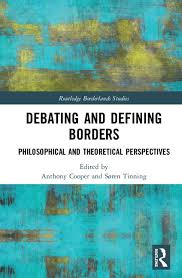As I started studying the limits, frames and boundaries between Northern Mexican literature and Chicano literature, I realized that border studies was not only research about space or geopolitical frontiers or the re-significance of the other and the difference. The study of borders is also the study of ontology and the metaphor of the political philosophical event. In this sense, over the last few years, I have been developing the Epistemological Model of Boundaries (Rodríguez, 2014a), which consists of the deconstruc- tion of the conceptual and spatial mapping of the classical border corpus considering specific cases of frontier zones (a border region and a cross- border region) such as the European Union-Africa, Europe-Middle East, Palestine-Israel, Morocco-Spain, Morocco-Algeria, as well as United States- Mexico-Central America (Rodríguez, 2016).
I refer to the study of frontier zones as one of the nine categories that I developed while conducting comparative studies between continents to understand the boundary phenomenon around the world. I realized that while the border is the administrative limit between two or more countries, frontier zones are more than a wall, a frame or a limit, and are the possibility of the event to come and the possibility of the pharmakon to sovereignty and democracy in the ‘state of law’.
As commonly known, the state of law guarantees obligations to the world community and the requirements of international law, but it is also an exception for some nation-states (rogue states), where, in the name of the sovereignty, they are closing their borders to others, paradoxically apply- ing several autoimmune practices (self-destruction) that directly attack the ideal of democracy and even the ideal of free movement within the European Union.
In this sense, whatever could occur with the autoimmune practices at the frontier zones open the possibility to the pharmakon as the poison in which nation-states impose their foreign and border policies in attempting to stop human mobility (I prefer to use this term instead of migrants and refugees) and as the antidote for the surveillance of the state of law, the democracy to come, that could be understood as unconditional hospitality or the thinking of différance.
As we can observe, some of the autoimmune practices in Europe and America consist of the construction of walls between countries as well as border externalization (others refer to outsourcing migration management) that need the figure of a safe third country to function (most of them countries without standards of human rights to handle human mobility issues). These border policies contradict certain democratic ideals that reinforce the idea that there is no sovereignty without force – that Derrida deconstructs in Rogues, Two Essays on Reason (2005). In this sense, in this chapter, I deconstruct the euphemistical policies of certain autoimmune practices at the frontier zones which avoid in the name of sovereignty human mobility between two or more countries in the European Union.
To deconstruct autoimmune practices at the frontier zones, which form part of border processes, I recover the premise to which Derrida refers: ‘Abuse of power is constitutive of sovereignty itself’ (2005, 102). I understand this abuse of power to be a self-protection of national borders, but not in the classic sense of war between states in which the need to liberate or found a national community, territory or sovereignty was the principal aim. What we are observing is a self-protection, which allows rogue states to transgress the rationality of their own sovereign exception in order to abuse their power (2005, 155–156).
To quote:
Rodríguez. R. “Beyond Borders: Autoimmune Practices in a State of Law (an aporia).” En Cooper y Tinning (eds.), Debating and Defining Borders. Philosophical and Theoretical Perspectives. New York: Routledge, volumen 1, 1ª edición, 2020, pp. 220-233. ISBN: 978-0-8153-5717-9.

Leave a comment